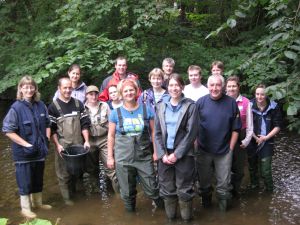The native white-clawed crayfish appears to be doing well in the Eden valley and the invasive American signal crayfish and the disease it carries – crayfish plague – are still absent from the River Eden system.
This is the findings of an ongoing SITA-Trust funded crayfish project carried out by Eden Rivers Trust. As part of this project another successful crayfish survey was completed recently, with a total of 65 sites surveyed and over 1000 crayfish recorded. This took place particularly on the Hoff and Helm Becks near Appleby, as well as on a number of other tributaries of the River Eden.
 The survey could not have been achieved without the dedicated help of 26 very capable and enthusiastic local volunteers – from all walks of life – who ventured into rivers to look under stones for these lobster-like creatures. Eden Rivers Trust would like to say a really big thank you to all the volunteers who helped, as well as to all the landowners who gave permission for the survey to take place on their land.
The survey could not have been achieved without the dedicated help of 26 very capable and enthusiastic local volunteers – from all walks of life – who ventured into rivers to look under stones for these lobster-like creatures. Eden Rivers Trust would like to say a really big thank you to all the volunteers who helped, as well as to all the landowners who gave permission for the survey to take place on their land.
Native crayfish are doing well in Cumbria, despite the fact that they have recently been re-classified as “endangered” (from “vulnerable”) by the International Union for Conservation of Nature (IUCN). The change in classification is because the UK’s native white-clawed crayfish has become even more rare and threatened than previously thought. This is particularly due to the spread of the American signal crayfish and the crayfish plague it carries, which are wiping out the native crayfish across the UK and Europe.
As part of it’s crayfish project, Eden Rivers Trust is looking for potential safe havens – called “Ark sites”- where it is that hoped native crayfish will survive should the dreaded American signal crayfish or crayfish plague arrive in the River Eden system.
Scale Beck near Appleby, a tributary of Hoff Beck, has been identified as a potential safe haven or Ark site. This is because of its location above the waterfall known as Rutter Force. The waterfall should act as a barrier to signal crayfish and crayfish plague and keep the resident native crayfish population above the waterfall safe.
Eden Rivers Trust is improving the condition of Scale Beck for the native crayfish population there. They require clean, clear water with a stony, silt-free river bed and a good supply of food in the form of invertebrates and leaf litter. Certain stretches of the beck are not in ideal condition and this is often due to farm animals trampling the banks and dunging in the river. This leads to erosion, pollution and excess soil in the water. To address this, the Trust has worked with local farmers to install over 1.3 km of riverside fencing, and further fencing and tree planting are planned for this winter.
Joanne Backshall, Conservation Officer at ERT, said, “The Eden Valley is one of the last strongholds in the UK for the native crayfish, and it is great to know that it is still doing well here. It is an indicator of the health of our rivers, so if crayfish decline it is likely that other wildlife such as fish, kingfishers and otters will too. If the white-clawed crayfish goes extinct, it would be a very sad legacy for future generations and would indicate that we are irreversibly damaging our environment.”
If you would like to learn more about the work of Eden Rivers Trust, you can visit www.edenriverstrust.org.uk. Alternatively, email office@edenriverstrust.org.uk or telephone the office, which is at Skirsgill Business Park, Penrith, on tel. no. 01768 866788.

White-clawed crayfish








